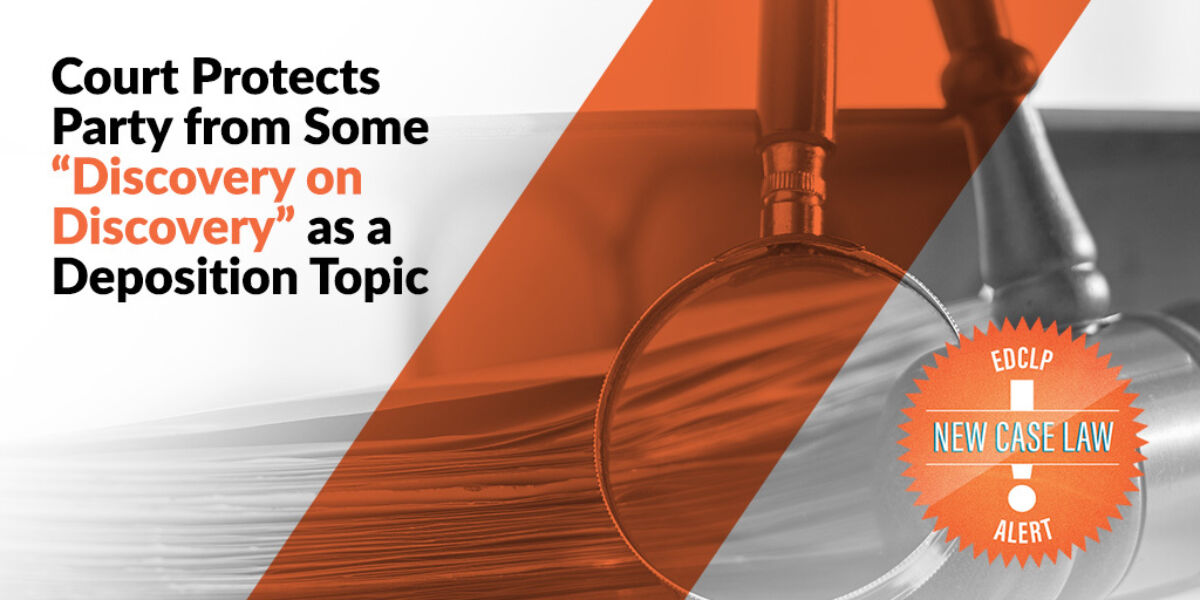E-Discovery
Court Protects Party from Some “Discovery on Discovery” as a Deposition Topic

Adamson v. Pierce County
W.D. Wash. Nov. 3, 2023
Why This Case Is Important
Opposing parties must cooperate during discovery, including on meet and confers about Rule 30(b)(6) depositions. However, even in contentious cases, the courts are not inclined to allow excessive discovery on discovery, as that can lead to “impermissibly broad meta-discovery.”
Overview
In this case, Sheriff’s Department deputies from Pierce County, Washington, sued the county and some of its employees for allegedly violating their freedom of speech and redress rights and for defamation, among other claims. Discovery had been contentious throughout, and the court had already denied two motions to compel filed by Plaintiffs.
Plaintiffs served Pierce County with a notice of deposition under FRCP 30(b)(6), seeking testimony about:
- Its search for records responsive to discovery request
- Its responses to discovery requests
- Alleged destruction of text messages beginning in 2019
- Text message policies in general
Defendant moved for a protective order as to all but one of Plaintiffs’ 30(b)(6) deposition topics.
Ruling
- Failures in cooperation. Magistrate Judge Leupold found that “facts here cut against both parties” as they “share a burden to meet and confer regarding the matters at issue.” Plaintiffs failed to send their proposed topics for the deposition before issuing the notice and assumed that Defendant did not object to the deposition topics and would produce a witness. Defendant did not serve objections or try to schedule a meet and confer until two days before the noticed deposition date.
- “Impermissibly broad meta-discovery.” In evaluating the merits of the Defendant’s motion for protective order, the court noted it can protect parties “from annoyance, embarrassment, oppression, or undue burden or expense” by limiting discovery, but it requires movant to meet “a heavy burden of showing why discovery should be denied.” Discovery on discovery is generally not permissible and must be demonstrated to be proportional and relevant. In this case, the court ruled that testimony on discovery responses and searches to locate documents would not be allowed.
- Testimony on Alleged Destruction Allowed. The court granted a modified version of the Plaintiffs’ request for 30(b)(6) testimony on alleged destruction of text messages and text message policies, citing a gap in the County’s production of texts beginning in 2019 and the inadequacy of Defendant’s explanation of the gap in production.
Case Law Tip
Have questions on how the FRCP applies to e-discovery? Want to make sure your arguments align with critical rules governing e-discovery? Check out this FRCP E-Discovery Quick Guide to get all your questions answered.
Legal Analysis
This case confirms that parties are typically correct to object to discovery on discovery absent a showing of bad faith or some sort of discovery deficiency. As the court noted, parties seeking discovery on discovery “must show a specific deficiency in the other party’s production.” Parties must be cognizant of perceived gaps in their productions to avoid potential discovery on discovery that can be costly both in terms of expense and in terms of the possibility of sanctions.